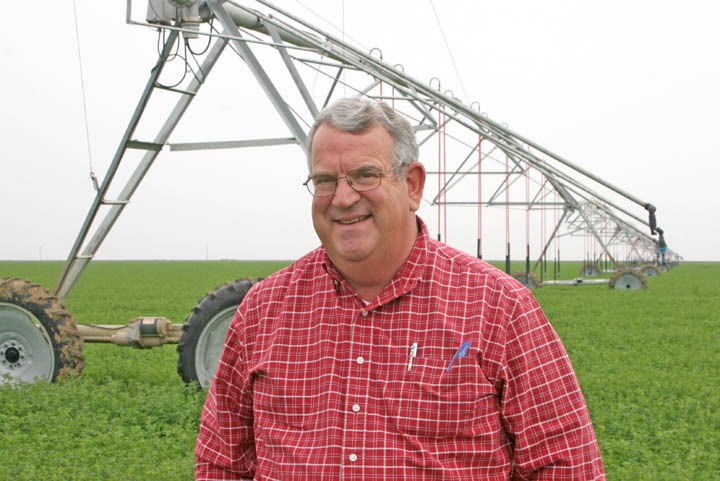
John Diener recognized again for pioneering, innovative farming.San Joaquin Valley West Side farmer faces challenging future with new ideas.Diener began experimenting with water and cost saving farming techniques two decades ago.Center pivot irrigation key element in conservation tillage approaches.
January 4, 2011

John Diener of Five Points, Calif., one of the most innovative farmers in the state, has picked up yet another award citing his pioneering farming efforts.
The University of California and Natural Resources Conservation Service (NRCS) Conservation Tillage Workgroup have selected him for this year’s Conservation Tillage Farmer Innovator Award.
Diener is a native of the West Side of the San Joaquin Valley and now farms 5,000 acres as Red Rock Ranch.
“John grew up right on the very farm he now manages and has been a leader, a very articulate spokesperson for Central Valley agriculture over the years, and a demonstrated true leader in a variety of civic, research and policy arenas,” said Jeff Mitchell, UC Davis cropping systems specialist and university conservation tillage research leader.
Diener received his award at a CT work group meeting recently at the UC West Side Research and Extension Center at Five Points.
In presenting the award, Mitchell cited Diener’s efforts in the early 1990s supporting the UC Sustainable Agriculture Research and Education Program. This included a demonstration project that encompassed 14 large-scale on-farm comparisons of alternative and conventional soil and pest management options for the region.
“In this project, Diener shared his innovative and highly successful soil management practices with other farmers in the Five Points-Huron-Mendota region and conducted very successful discussions of the now well-known Four Corners area of his farm, in which he has been using four different management approaches for a number of years with very dramatic impacts.”
The data set developed from this 4-way comparison enabled UC and the CT Workgroup to work with several UC and USDA National Soil Tilth Lab scientists to develop a soil quality index for the region, said Mitchell.
More recently, Diener has developed a wide variety of conservation tillage approaches for several of his crops. Seven years ago, he experimented with no-till wheat following corn and was able to save two spring irrigations due to the reduced soil evaporation under the residues from his previous crop.
Soon after, he tried a short-season cotton crop immediately following wheat and managed to harvest it before Christmas. He also was a pioneer at trying no-till cotton in heavy residues, as well as no-till corn and canola. After travelling to Washington State in 2005 to learn from other farmers about overhead center pivot irrigation systems, John concluded that the way to make conservation tillage happen in California’s San Joaquin Valley is to couple it with overhead irrigation systems.
“He is leading the development of the merger of these technologies in California to tremendous environmental and economic advantage,” said Mitchell.
Saving water, fuel and labor
Diener now farms under 11 pivots. The systems he has developed save water, fuel and labor, and other farmers have noticed. There are now 35 to 40 additional pivots operated by other farmers on the West Side.
A year ago Diener was the first farmer in California to plant strip-till corn following wheat under center pivot irrigation.
“These types of systems will very likely have increasing importance in California’s West Side region in the future because of their resource conservation benefits and because they also reduce production costs,” said Mitchell.
“The various CT approaches that John has tried, learned from and developed were not at all easy and involved considerable risk. They now, however, enable others to move forward more smoothly with their own CT systems,” Mitchell noted.
“John Diener is an exceptionally insightful, conservation-minded and overall successful farmer. He is always looking for a better way of doing things, and through the vast visibility he has achieved throughout the region, he has brought tremendous innovation and natural resource conservation benefits to the entire San Joaquin Valley,” Mitchell said.
Diener’s latest recognition complements other awards he has received, including the Governor’s Innovative Irrigator Award, UCD’s Distinguished Alumnus Award, and just last year the Leopold Conservation Award.
Diener is also heavily involved in finding solutions to the growing perched water/drainage issue that poses a major threat to irrigated agriculture in California. He is immersed in a project called Integrated On-Farm Drainage Management (IFDM). A test site for the idea is nestled in a corner of his 5 Red Rock Ranch.
The goal of IFDM is to separate the salts from farmland drain water; sell the byproduct solids to industry, and either use the cleaned up water for farming or sell it as fresh water to the cities.
IFDM is using water purification systems like those used in hospitals and ion exchange technology to separate out the solids, many of which can be sold as industrial chemicals.
About the Author(s)
You May Also Like





